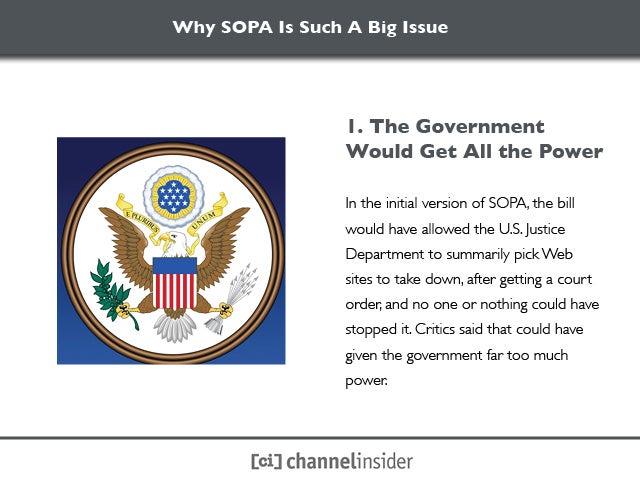 1. The Government Would Get All the Power
1. The Government Would Get All the Power
In the initial version of SOPA, the bill would have allowed the U.S. Justice Department to summarily pick Web sites to take down, after getting a court order, and no one or nothing could have stopped it. Critics said that could have given the government far too much power.
 2. What About Legitimate Sites?
2. What About Legitimate Sites?
One of the main issues with SOPA is that it doesn’t adequately protect legitimate sites that might have mistakenly added copyrighted content to its pages. What’s more, it doesn’t protect sites, like Facebook, that allow users to upload whatever they want. And what would happen with YouTube? Legitimate sites would get hit hard with SOPA.
 3. The Web Is Meant to Be Free
3. The Web Is Meant to Be Free
It’s fine to fight piracy, since as many lawmakers point out, it can take American jobs, but the Internet is also a place to be free. And trying to censor content and all but remove freedom of speech from Web sites might be enough to end that. SOPA would have been a major issue.
 4. Lawmakers Have No Reasonable Alternatives
4. Lawmakers Have No Reasonable Alternatives
Unfortunately, the lawmakers that proposed SOPA and Protect IP didn’t come up with alternatives that would have made sense. Instead, they tried to remove certain features of the bill — DNS blocking, for one — but tried to keep most of it intact. That alone hurt SOPA’s ability to even come close to passing.
 5. It Was Vague From the Beginning
5. It Was Vague From the Beginning
Unfortunately, SOPA was written to be vague. The bill in no way protected, as noted, legitimate sites, and could have given the U.S. government free rein to take down just about any site it wanted without much effort. Any bill needs focus, and SOPA just didn’t have it.
 6. It Wouldn’t Stop the Problem
6. It Wouldn’t Stop the Problem
Let’s face it: as nice as it sounds to end piracy, the chances of that happening are slim. Piracy is a huge business for cybercriminals, and even if a single site is shut down, they can always open two more to hedge their bets. A simple bill isn’t enough to solve piracy troubles.
 7. Big Companies Are Involved
7. Big Companies Are Involved
So, just why has SOPA become a big issue? Blame it on the big companies. Several influential web companies, from Google and Facebook to Wikipedia, have sounded off against SOPA. And considering how many people use those services, it shouldn’t surprise anyone that SOPA became a big issue so quickly.
 8. Repealing It Would Be Nearly Impossible
8. Repealing It Would Be Nearly Impossible
The critics know that repealing a major bill, such as SOPA or PIPA, would be extremely difficult. Washington hasn’t necessarily been working so well in the past few years, and even though SOPA had, at one time, bipartisan support, it’s tough to see how the act would have been repealed after being passed. Critics realized quite early that stopping it now would have been their best bet.
 9. Sites All But Disappear
9. Sites All But Disappear
In the initial version of SOPA, the bill gave the U.S. government the power to practically eliminate Web sites from the Internet. In other words, there would have been no trace of them left on the Web. Is that a scary prospect? You bet.
 10. It Hurts Businesses in A Big Way
10. It Hurts Businesses in A Big Way
Although much of the focus related to SOPA revolved around big companies, like Google and Wikipedia, the bill could have also negatively impacted small businesses. After all, small companies often link to other content, and if that content is copyright protected, they might run into serious trouble. There were no safeguards in place for small businesses in SOPA. And that was a major problem.

